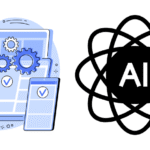
The Best Cross-Platform Framework provides developers with flexibility, rapid development capabilities, and easy maintenance, supporting a diversified device ecosystem with superior app quality.
Choosing the right cross-platform framework plays a vital role in app development. With so many options available, it can be challenging to determine the best one for your project. The framework comparison is necessary to find the optimal multi-platform tool that suits your specific needs and preferences.
Cross-platform frameworks enable developers to create apps that can function seamlessly on multiple platforms using a single codebase. This streamlined development process saves time and reduces costs, making it an attractive option for many businesses.
Key Takeaways
- Choosing the right cross-platform framework is essential for efficient app development.
- Framework comparison is necessary to find the optimal multi-platform tool.
- Cross-platform frameworks allow for streamlined development across multiple platforms.
Understanding Cross Platform Development
Cross-platform development refers to the process of building software applications that can run on multiple platforms. It involves creating a single codebase that can be used to develop apps for various operating systems, such as iOS, Android, and Windows.
Unlike native app development, where separate codebases are required for each platform, cross-platform development offers the advantage of code reusability. This means that developers can write code once and deploy it on multiple platforms, saving time and effort.
Another advantage of cross-platform development is that it enables developers to reach a wider audience with their apps. By building apps that can run on multiple platforms, developers can make their products accessible to users on various devices and operating systems.
Overall, cross-platform development is a cost-effective and efficient way to build mobile and web applications that can run on multiple platforms, without compromising on performance or user experience.
Factors to Consider When Choosing a Cross Platform Framework
Choosing the right cross-platform framework is critical for developing a successful mobile application. When making a decision, it’s important to consider several factors to ensure the framework meets the project’s requirements. Here are some key considerations when selecting a cross-platform framework:
Platform Support
One of the most important factors to consider when choosing a cross-platform framework is platform support. The framework should support the platforms you want to target, such as iOS, Android, and Windows. Some frameworks specialize in certain platforms, so it’s important to choose one that aligns with your target audience.
Performance
Another important factor to consider is the performance of the framework. Cross-platform frameworks may have limitations that can impact the app’s performance. It’s crucial to choose a framework that balances performance with code reusability.
Community Support
The community support behind a cross-platform framework is another critical factor. The framework should have an active community that can provide support, answer questions, and offer resources to developers. Community support ensures that the framework stays up-to-date and compatible with new devices and operating systems.
Ease of Use
Finally, ease of use is another factor to consider when selecting a cross-platform framework. The framework’s documentation and tooling should be easy to understand and use, particularly for developers who are new to the framework.
The Top Cross Platform Frameworks
Choosing the best cross-platform framework is crucial for efficient and successful app development. In this section, we will provide an overview of the top cross-platform frameworks available in the market and highlight their key features and strengths.
React Native
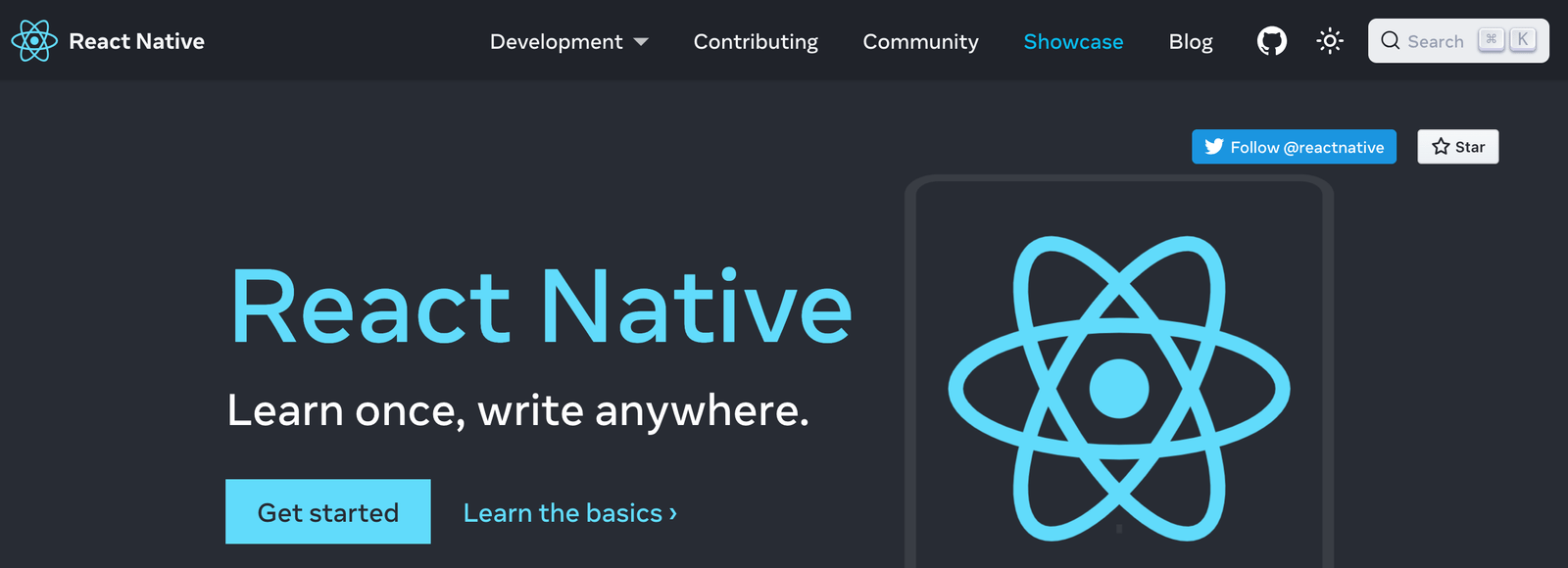
React Native is one of the most popular cross-platform frameworks, widely used by developers due to its performance and ecosystem. It allows for writing native-like mobile applications with the help of JavaScript and React. Its platform-agnostic approach can render code for both iOs and Android, making cross-platform development efficient and effective.
One of the key advantages of React Native is its hot reloading feature, allowing developers to see the changes in code in real time, without having to restart the app. Code sharing is also possible between platforms, and third-party libraries can be integrated easily. Here is an example of React Native’s syntax:
"import React from 'react';" "import { Text, View } from 'react-native';" "const App = () => {" return ( <View> <Text>Hello World!</Text> </View> );" };
Flutter
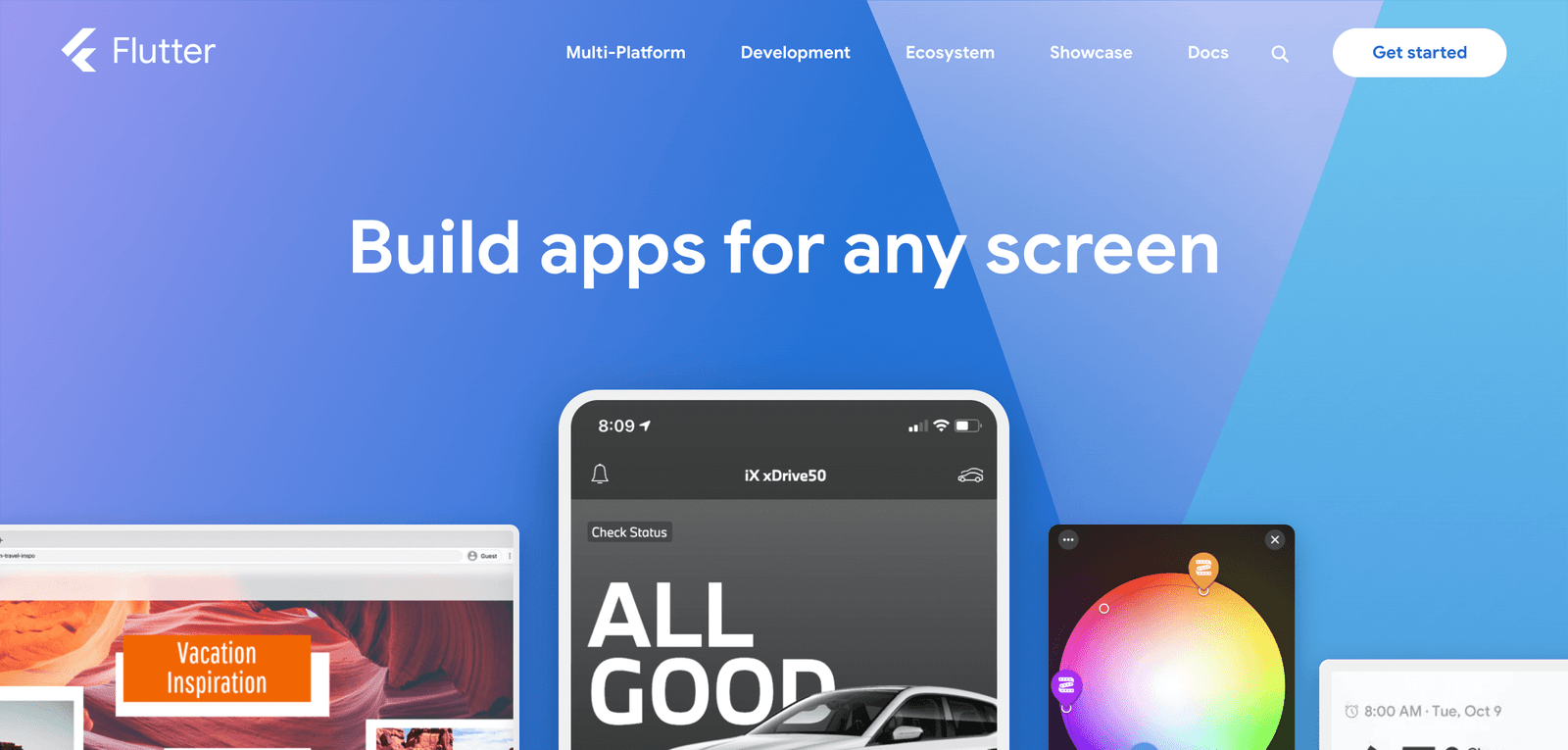
Flutter is another leading cross-platform framework, featuring fast development and native-like performance. Its reactive programming model enables building complex user interfaces and animations efficiently. Flutter also offers a wide range of customizable widgets, making it easy for developers to design visually appealing UIs. It uses Dart programming language and has a supportive community of developers contributing to its development.
Flutter utilizes a “hot reload” feature, allowing for real-time changes to the code without losing app state. The framework also provides the advantage of customizable widgets, making it easier for developers to create sophisticated UI designs. Here is an example of Flutter’s syntax:
"import 'package:flutter/material.dart';" "void main() {" runApp(MyApp());" }"
Xamarin
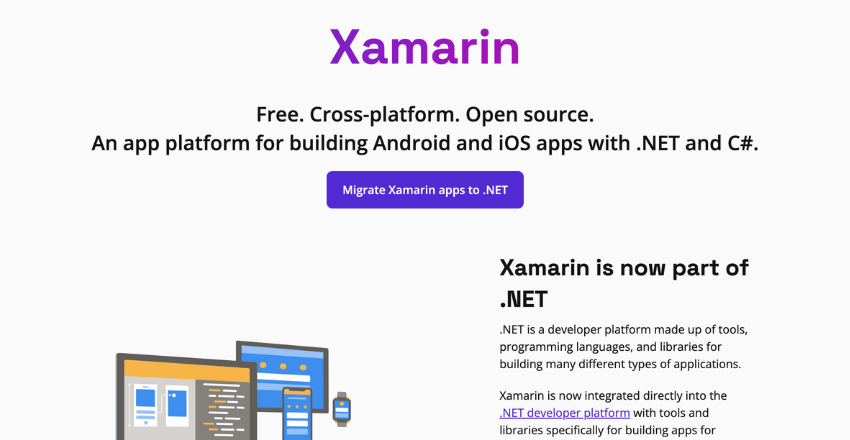
Xamarin is a popular cross-platform framework that uses C# and .NET. One of the biggest advantages of Xamarin is its compatibility with Visual Studio, which allows for better integration with other Microsoft products. It also offers a large collection of plugins and a supportive community. However, it has some limitations in terms of performance and flexibility.
Xamarin’s primary strength lies in sharing code between multiple platforms, saving considerable development time. Here is an example of Xamarin’s syntax:
"using Xamarin.Forms;" "public class App : Application {" public App() {" MainPage = new ContentPage {" Title = 'Xamarin Demo'," Content = new StackLayout {" Children = {" new Label {" Text = 'Xamarin.Forms'," VerticalOptions = LayoutOptions.CenterAndExpand, HorizontalOptions = LayoutOptions.CenterAndExpand" } } }" };" }" }"
Ionic
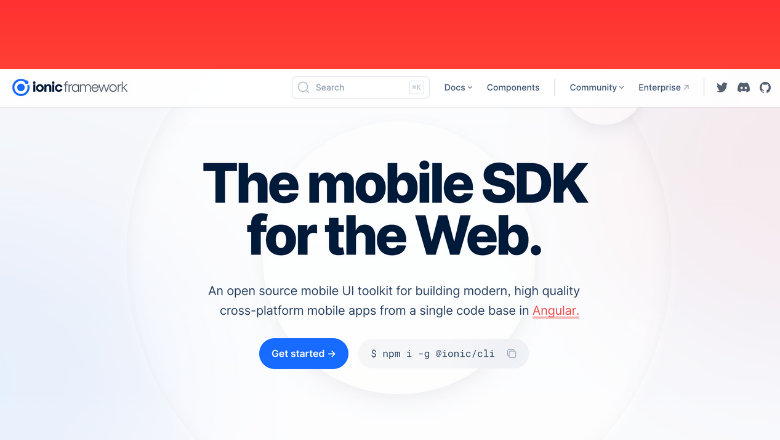
Ionic is a popular hybrid cross-platform framework that leverages web technologies such as HTML, CSS, and JavaScript. It offers a wide range of UI components and features, making it easier to build dynamic mobile apps with web development skills. Ionic also offers a large community of developers and resources for utilizing different plugins for added functionality.
One of the advantages of using Ionic is its compatibility with Angular, making it easy to implement into existing Angular projects. Here is an example of Ionic’s syntax:
"import { Component } from '@angular/core';" "@Component({" selector: 'page-home'," templateUrl: 'home.html'" })" "export class HomePage { " constructor() { " }" }"
NativeScript
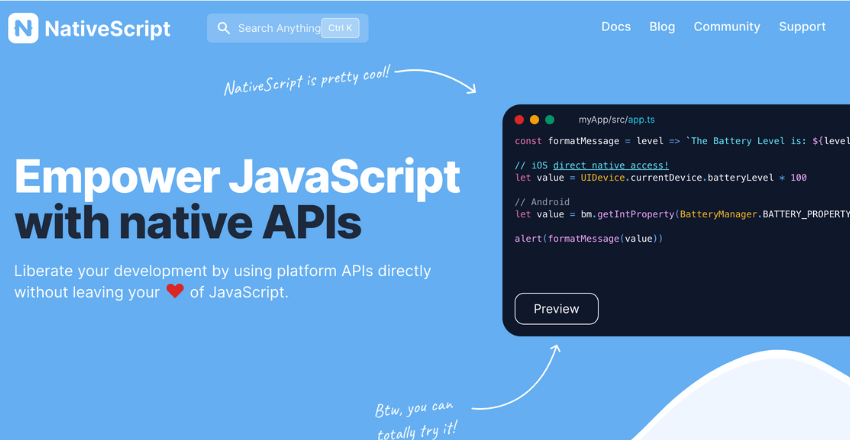
NativeScript allows developers to build native mobile applications using JavaScript or TypeScript. One of its advantages is its flexibility as it allows for direct access to native APIs and libraries, making it easier to build complex applications. It also supports a wide range of plugins, making it easy to add native-like functionality to the app. NativeScript also has a large and supportive community of developers contributing to its development.
NativeScript’s strengths lie in its performance and flexibility when building custom UIs for a specific platform. Here is an example of NativeScript’s syntax:
"import { Component } from '@angular/core';" "@Component({" selector: 'my-app'," template: '<Label text='Hello NativeScript!'>' "})" "export class AppComponent { " }"
After reviewing the top cross-platform frameworks, it’s important to evaluate which one is the best fit for your specific project requirements and goals.
Finding the Best Cross-Platform Framework for Your App Development Needs
Choosing the right cross-platform framework for your app development needs can greatly impact the success of your project. After reviewing the top options available in the market, it is important to consider specific factors such as platform support, performance, community support, and ease of use. By carefully evaluating these criteria and considering project requirements and preferences, you can make an informed decision.
It is important to note that there is no one-size-fits-all solution when it comes to cross-platform development. Depending on the nature of your project and its unique requirements, certain frameworks may be better suited to your needs than others. It is essential to evaluate each option critically and weigh the pros and cons before making a decision.
Ultimately, the optimal multi-platform tool will be the one that best meets your project’s needs, while also allowing for streamlined coding, reduced development time, and increased productivity. By choosing the right framework, you can boost efficiency in your app development process and achieve success in your project.
Boost Efficiency with the Right Choice
Choosing the right cross-platform framework for your app development needs is crucial to boosting efficiency and productivity. With the right tool, you can streamline your coding and reduce development time, resulting in faster time-to-market and increased revenue.
Not all frameworks are created equal, and it’s important to carefully evaluate each one based on your project requirements. Factors such as platform support, performance, community support, and ease of use should all be considered when making a decision.
By selecting the optimal multi-platform tool, you can achieve native-like performance and functionality while utilizing your preferred programming language and development environment. This allows for a smoother workflow and more efficient collaboration between team members.
Continuously learning and adapting to new cross-platform frameworks and technologies is also crucial to staying ahead in this ever-evolving field. By staying up-to-date and informed, you can ensure that you are always utilizing the most efficient and effective tools for your app development needs.
Ultimately, choosing the right cross-platform framework can make all the difference in your app development process. By boosting efficiency and productivity, you can achieve your development goals faster and with greater success.
Finding the Optimal Multi-Platform Tool
In today’s fast-paced and competitive app development industry, finding the optimal multi-platform tool is crucial to stay ahead of the game. As discussed earlier, cross-platform frameworks offer numerous advantages, including code reusability and streamlined development. However, choosing the right framework for a specific project requires careful consideration of multiple factors.
Firstly, consider the required platform support, including mobile devices, web browsers, and desktop applications. It is essential to ensure the chosen framework can adequately support the target platforms while optimizing performance and user experience.
Community support is another vital aspect to consider, as it provides access to a wide range of resources, libraries, and plugins. Frameworks with active and engaged communities often offer continuous updates and support, ensuring the software remains relevant and up-to-date.
Additionally, the ease of use is a critical factor in determining the optimal multi-platform tool. With numerous frameworks available, selecting a user-friendly framework that aligns with the team’s skill set and project requirements can significantly improve development efficiency and reduce costs.
Finally, project-specific requirements, such as the app’s complexity and functionality, timeline, and budget, should be taken into account when selecting a cross-platform framework. By considering these factors, developers can choose the optimal multi-platform tool for their project needs.
It is crucial to continuously learn and adapt to the ever-evolving technology landscape to ensure the optimal multi-platform tool remains the best choice for app development. Keeping up with the latest trends and updates can keep development teams on the cutting edge and improve app performance, user experience, and overall success.
Hire Cross Platform for Your App Development Needs
When it comes to cross-platform app development, Hire Cross Platform is the go-to solution for businesses looking to optimize their productivity and efficiency. Our team of expert developers from South America is proficient in utilizing the best cross-platform frameworks that suit your specific project requirements, ensuring that you get the best results for your investment.
With Hire Cross Platform, you can rest assured that your app development needs are in good hands. We offer a range of flexible hiring models that allow you to choose the right developer for your project. Our developers have extensive experience in developing cross-platform apps with frameworks such as React Native, Flutter, Xamarin, Ionic, and NativeScript.
At Hire Cross Platform, we believe in continuous learning and adaptation in this ever-evolving field. We stay up-to-date with the latest trends and technologies to ensure that we provide the optimal multi-platform tool for your app development needs. Whether you’re a startup or a large enterprise, we have the expertise to deliver scalable and cost-effective solutions that meet your business requirements.
So if you’re looking for the best cross-platform app development services, look no further than Hire Cross Platform.
Contact us today to hire a skilled cross-platform app developer and start building your next big app.
External Resources
https://dotnet.microsoft.com/en-us/apps/xamarin
FAQ

Q: Which cross-platform framework is the best?
A: The best cross-platform framework depends on your specific project requirements and preferences. There are several top frameworks available such as React Native, Flutter, Xamarin, Ionic, and NativeScript. Each framework has its own strengths and features that make it suitable for different types of app development.
Q: What is cross-platform development?
A: Cross-platform development is the process of building mobile applications that can run on multiple platforms, such as iOS and Android, using a single codebase. This approach allows developers to write code once and deploy it across different platforms, saving time and effort compared to developing separate native apps for each platform.
Q: What factors should I consider when choosing a cross-platform framework?
A: When selecting a cross-platform framework, it’s important to consider factors such as platform support, performance, community support, and ease of use. You should also evaluate the framework’s documentation, tooling, and ecosystem to ensure that it aligns with your development needs and goals.
Q: What are the top cross-platform frameworks?
A: Some of the top cross-platform frameworks include React Native, Flutter, Xamarin, Ionic, and NativeScript. These frameworks have gained popularity for their ability to streamline app development across multiple platforms and offer various features and advantages.
Q: What is React Native?
A: React Native is a widely-used cross-platform framework developed by Facebook. It allows developers to build native mobile apps using JavaScript and React, a popular JavaScript library for building user interfaces. React Native offers a rich ecosystem, high performance, and the ability to reuse code across platforms.
Q: What is Flutter?
A: Flutter is a cross-platform framework developed by Google. It enables developers to build high-quality native interfaces for iOS and Android using a single codebase written in Dart, a programming language created by Google. Flutter offers fast development, hot reload, and native-like performance.
Q: What is Xamarin?
A: Xamarin is a cross-platform framework that allows developers to build native mobile apps using C# and .NET. It provides compatibility with Visual Studio, a popular IDE, and offers a wide range of libraries and components for building powerful mobile applications.
Q: What is Ionic?
A: Ionic is a cross-platform framework that enables developers to build mobile apps using web technologies such as HTML, CSS, and JavaScript. It follows a hybrid app development approach, allowing developers to create apps that can run on multiple platforms while using web technologies they are familiar with.
Q: What is NativeScript?
A: NativeScript is a cross-platform framework that allows developers to build native mobile apps using JavaScript or TypeScript. It provides access to native APIs and UI components, allowing for a high degree of flexibility and creating apps with native-like performance.
Q: How do I choose the best cross-platform framework?
A: To choose the best cross-platform framework, you should consider your specific project requirements, such as platform support, performance needs, and development team expertise. It’s also important to evaluate the framework’s documentation, community support, and ecosystem to ensure a smooth development experience.
Q: How can hiring cross-platform app developers benefit my project?
A: Hiring cross-platform app developers can benefit your project by leveraging their expertise in utilizing the best cross-platform frameworks. They can help streamline the development process, improve efficiency, and ensure that your app is compatible with multiple platforms, reaching a wider audience.
Q: Why is it important to find the optimal multi-platform tool?
A: Finding the optimal multi-platform tool is crucial for app development as it allows for streamlined coding, reduced development time, and increased productivity. By choosing the right tool based on your project requirements, you can ensure efficient and successful cross-platform app development.
Q: What is Hire Cross-Platform?
A: Hire Cross-Platform is a reliable source for hiring cross-platform app developers from South America. Their team of experienced developers specializes in utilizing the best cross-platform frameworks to deliver efficient and successful app development projects.
Charlotte Williams is a talented technical author specializing in cross-platform app development. With a diverse professional background, she has gained valuable experience at renowned companies such as Alibaba and Accenture. Charlotte’s journey in the tech industry began as a mobile UX designer back in 2007, allowing her to develop a keen understanding of user-centric app design.
Proficient in utilizing frameworks like React Native and Flutter, Charlotte excels in building cross-platform mobile apps and imparting her knowledge to aspiring developers. She pursued a degree in Computer Science at Cornell University, equipping her with a strong foundation in the field. Residing in San Francisco with her three beloved dogs, she finds solace in hiking the hills and connecting with nature. Charlotte’s passion for app development, combined with her dedication to sharing expertise, makes her an invaluable resource in the world of cross-platform app development.



